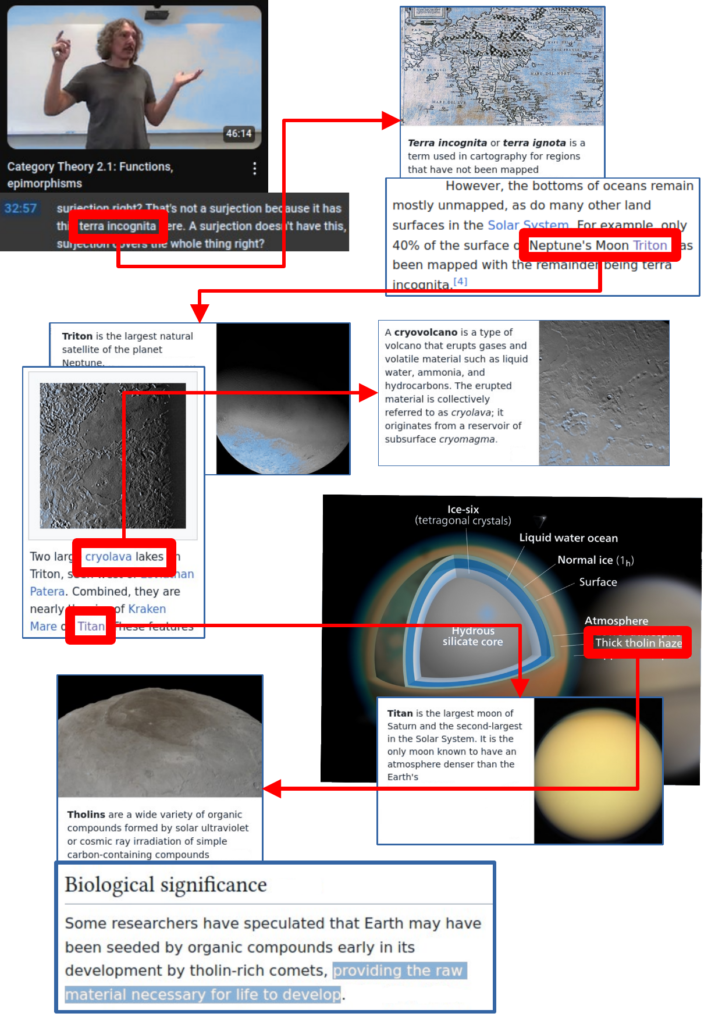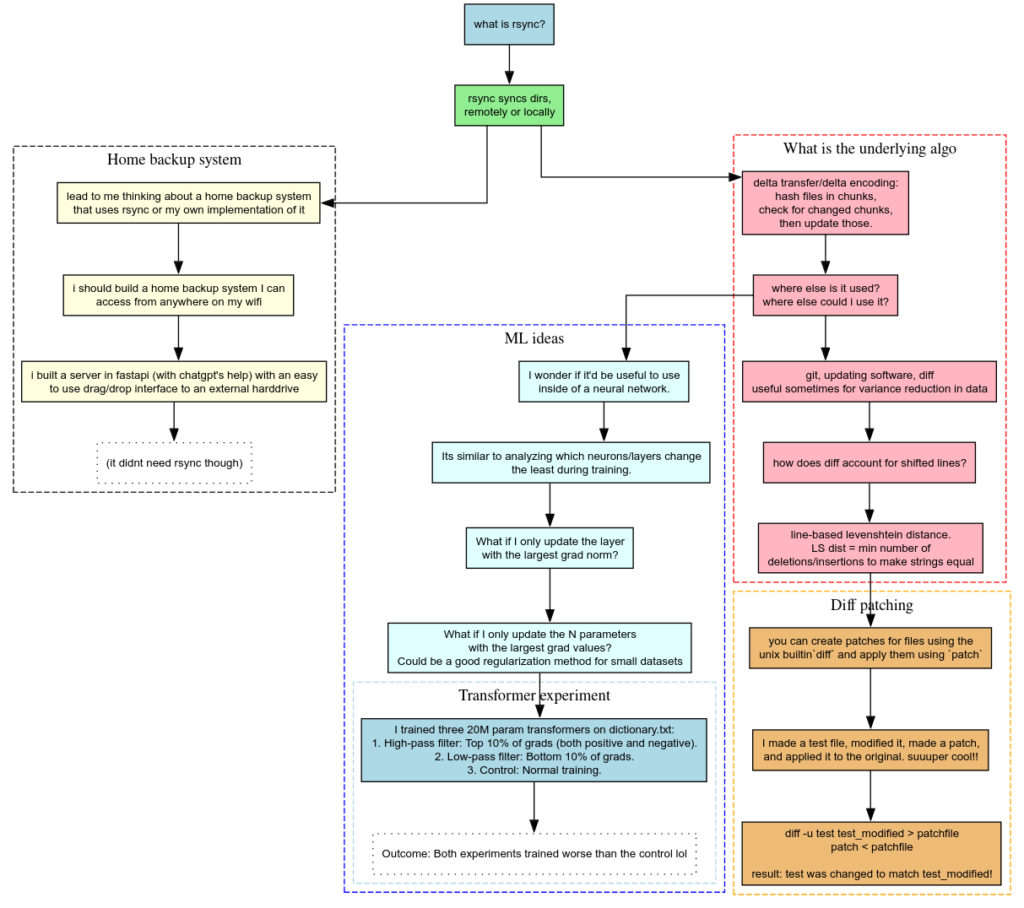
Summary of the whole article:
The habit:
- Every time you hear a new term/concept, look it up immediately
- As you read about it, you’ll form questions and find more new, unfamiliar ideas/terms. Look up the ones that interest you the most
- Repeat (recursive)
Going down a rabbit hole for every unfamiliar concept (or any concept you choose, really) will lead you to learn a ton and have a lot of fun. This will make you remember the initial concept waaaay better, with more detail/meaning, and you’ll learn more than just that one concept.
It’ll also (hopefully) make you enjoy learning more (in general), which is a huge long-term advantage that will make you learn more effectively. I link some resources if you want to read more about using interest to your advantage. Some of the smartest people I’ve met seem to have this habit of going down rabbit holes, and also loving learning.
I include some examples of rabbit holes ~midway through the article. Feel free to skip that section if you already get what a rabbit hole looks like
Look up every new concept (and go further)
Some useful advice:
“Whenever you hear or read a term you don’t know, look it up immediately”
A teacher told me this, and I followed this for years because it was easy and worked well. I’d hear a term I didn’t know, google it, read a bit til I understood it, done. It’s been extremely, extremely useful advice, and I’ve learned a lot because of it.
But I realized if I went further, by diving deep into the ‘rabbit hole’ that the term leads to – I’d learn WAY more.

With rabbit holes, you don’t just learn the definition of a new concept. You might also learn how to use it, or learn cool related concepts you don’t know, etc. In combination with “look up every unfamiliar concept/term” this is incredibly powerful
Rabbit holes are a great way to remember concepts in a very meaning-rich form (i.e. the details of what they do, how they interact with other concepts, etc). You’ll remember the initial concept much better because of all the additional meaning tied to it. It’s a much MUCH richer, satisfying, surprising, and beautiful learning experience.
So when you hear a term you don’t know, look it up, and push yourself to go a bit further than learning surface level information. Go a few steps deeper. Eventually it will just feel natural and you won’t have to ‘push’ yourself to do it.
Example rabbit holes
Someone tweeted about rsync. I didnt know what it was. so I googled it.
rsync is a unix program that syncs directories.
Ok, cool, it syncs files or something.
In the past, I’d usually stop researching at this point, and go back to being distracted on twitter. This ‘rabbit hole’ would look something like:

But this time I looked further, to test this idea of chasing rabbit holes.
How does rsync work? I opened up google images (a fast way to learn things, btw, if you’re very visual) and scrolled through and looked at some diagrams. Wait, it repeatedly syncs entire directories by only updating the parts that have changed???? wtf, that’s insanely useful, and solves a problem I’ve been thinking about for a while.
Then I had more questions. What is the underlying algorithm and where else is it used? When is rsync typically used or NOT used? Is it common practice to avoid using it in some environments? Does it have security risks? Are there other versions that operate better or have different useful features?
The graph ended up getting pretty crazy:

This was a really fun and surprising lil adventure and the ideas I encountered along the way will probably stick in my brain for a very long time because of that.
Here’s another smaller example. Previously my flowchart would look like:

Whereas now it looks like:

I go down a ton of these rabbit holes now (often several a day) and could make a lot more graphs like this. Whenever I learn a new concept I go deeper into the concepts that surround it, and so on. Not just in my free time but also at work, where diving extremely deep into the rabbit holes of concepts relevant to my company has paid off immensely.
Rabbit holes make learning more fun
I realized, going deeper into new concepts can make them significantly richer and more interesting. The information you get out of rabbit holes tends to be much more surprising (high entropy/high surprisal stuff that fits the curve) and you tend to remember the info way better.
Tangent: In ML, some architectures (like Google’s Titan) use surprise to determine what to remember!

“we design this memory module so an event that violates the expectations (being surprising) is more memorable”
Sometimes you might have to push yourself to dig a little deeper. Personally, my brain (incorrectly) tends to predict that going down a concept’s rabbit hole will be boring. But it feels natural to keep digging once I’ve started, because I quickly feel it becoming more interesting.
I have a much deeper love for learning after realizing how beautiful and interesting of a learning experience rabbit holes can be.
Many really smart or skilled people seem to have in common the fact that they go down rabbit holes. Once I noticed this and started doing it I can immediately see why they do it (bc its fun lol), and I get how it would make them smarter/more skilled.
Interest is a huge learning advantage
Fostering interest is one of the most powerful ways to get good at something over the long run.
It’s also a great way to make others good at something. For example, I have a friend who wasn’t good at chess. He’d never play it with me or our other friends. One day I told him “It’d be hilarious if you secretly trained chess and one day out of nowhere beat [our other friend]”. Since he’s competitive and likes to do funny stuff like this, he immediately got hooked on chess. He eded up beating that friend, and now beats pretty much every person he plays irl. Interest => skill
Some of the most talented programmers I’ve met started out making minecraft mods. I made them early on, too, and they significantly increased my interest in programming, which made me dedicate tremendous amounts of time and effort to it over the last ~13yrs.
When you get very interested in something, your mind gets better at understanding it in the background. It’s almost like your mind becomes altered to be better at learning it. I don’t understand this phenomenon well enough to explain/teach it. But here are some resources on this idea that I’ve found useful, and that I think you will too:
- Colin Galen, a top competitive programmer, talks about how he got his subconscious to work on becoming good at competitive programming in the background
- The Tetris effect
So yeah. Hopefully the ideas in this article will lead to you having much richer and more interesting learning experiences, more often. Look up every unfamiliar concept, and follow the rabbit holes it leads down (you may have to push yourself a bit at first).

Very nice view of the world! I liked that